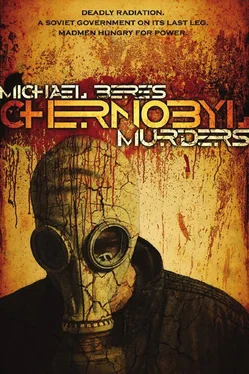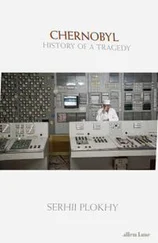Michael Beres - Chernobyl Murders
Здесь есть возможность читать онлайн «Michael Beres - Chernobyl Murders» весь текст электронной книги совершенно бесплатно (целиком полную версию без сокращений). В некоторых случаях можно слушать аудио, скачать через торрент в формате fb2 и присутствует краткое содержание. Жанр: Триллер, на английском языке. Описание произведения, (предисловие) а так же отзывы посетителей доступны на портале библиотеки ЛибКат.
- Название:Chernobyl Murders
- Автор:
- Жанр:
- Год:неизвестен
- ISBN:нет данных
- Рейтинг книги:4 / 5. Голосов: 1
-
Избранное:Добавить в избранное
- Отзывы:
-
Ваша оценка:
- 80
- 1
- 2
- 3
- 4
- 5
Chernobyl Murders: краткое содержание, описание и аннотация
Предлагаем к чтению аннотацию, описание, краткое содержание или предисловие (зависит от того, что написал сам автор книги «Chernobyl Murders»). Если вы не нашли необходимую информацию о книге — напишите в комментариях, мы постараемся отыскать её.
Chernobyl Murders — читать онлайн бесплатно полную книгу (весь текст) целиком
Ниже представлен текст книги, разбитый по страницам. Система сохранения места последней прочитанной страницы, позволяет с удобством читать онлайн бесплатно книгу «Chernobyl Murders», без необходимости каждый раз заново искать на чём Вы остановились. Поставьте закладку, и сможете в любой момент перейти на страницу, на которой закончили чтение.
Интервал:
Закладка:
Gypsies hid among civilized citizens. The landlord who killed his parents was a Hungarian Gypsy. Barbara, who seduced and humiliated him during his hazing in the GDR, was half-Russian and half-Hungarian. Hungarians, Gypsies, people famous for their supposed contribution to the arts. The musical Czigany. The so-called poets and writers. Perhaps Horvath and Popovics were among them, hidden away in a Kiev garret.
Komarov inhaled deeply on his cigarette, thinking of Tamara Petrov. Earrings flashing, bracelets clanging, hair as black as the night, black hair making her olive skin appear lighter than it was as she wept in his office, weeping because she had turned in one of her own.
This afternoon, even Deputy Chairman Dumenko had fallen briefly under Tamara Petrov’s spell when looking at photographs of her in the interrogation room. Tamara Petrov grimacing and frowning and even laughing at the hidden camera while Captain Brovko questioned her. More trickery, appearing courageous when she was really a coward. Or was she?
Komarov felt something on his finger and realized his cigarette had burned down to a butt. He put the cigarette out and lit another. He rubbed the surface burn, brought his finger to his nose, and smelled the acrid odor of burned flesh. The odor brought back memories of his years in the GDR at the “safe” house outside East Berlin. An old captain from the Great War named Alexeev used the method often. The captain would lean close to the victim, speaking softly, like a grandfather whispering to his grandchild. Then he would lock the victim in a grip with one arm and press his lit cigarette to the victim’s neck. Komarov had smelled this mixture of cigarette smoke and smoldering flesh many times when passing the interrogation room and hearing the screams of victims. It was a smell he had never forgotten.
If Captain Alexeev had come back from the dead to terrorize Tamara Petrov in the interrogation room, would more have been revealed? Perhaps it would be wise to interrogate her again. Perhaps he could do a better job than Captain Brovko, especially if he did it under different circumstances.
Komarov stood and put out his cigarette. He went into the house, where the only light came from the glow of the television in the living room. The television showed a rerun of Gorbachev’s spineless Chernobyl speech. On his way out the front door, he told his wife he would be gone at least two hours on business. Her only response was to raise her hand limply.
Komarov parked a block away from Club Ukrainka and walked. He would be able to check on his men. And if his men did not recognize him, there was no need to explain his follow-up questioning of Tamara Petrov. Better to visit Club Ukrainka as a stranger in an overcoat with the collar drawn up about his face. When he passed the Volga, he saw both men inside. A flashlight lit up the seat between them for a moment. They were playing cards. He walked on, purposely giving himself a slight limp, and entered Club Ukrainka.
The place was dark, the air thick with smoke and the smell of Turkish coffee. He sat at a table near the entrance and put out the candle on the table. He ordered coffee and paid for it as soon as it was delivered. He kept his coat on and held the cup in front of his face.
Tamara Petrov was on the far side of the room at a table to one side of the small stage. Onstage, a thin, bearded man made his saxophone sound like an old man who had eaten too many beans. When the man stopped playing, a few people clapped, and the man went to Tamara Petrov’s table. The man’s cheeks had been puffed up when he played. Now they were sunken, and, in profile, Komarov recognized Jewish features. First the Gypsy, now a Jew who blows farts on his saxophone while she applauds him, smiles at him, invites him to her table, and perhaps to her apartment.
Komarov imagined Tamara Petrov kissing the bearded Jew, using the wiry black beard to clean between her teeth the way prostitutes clean their teeth on pubic hair. Suddenly, he thought of Dmitry with a man, in bed with a man, the taste of salt and the feel of hair inside one’s mouth. A wave of nausea came over him, nausea so strong he had to go to the washroom and splash cold water on his face. The water from the spigot smelled metallic. He took deep breaths from the open window in the washroom. When he finally recovered, he returned to his table, held his coffee cup in front of his face, and watched Tamara Petrov.
The saxophonist was back onstage, puffing his cheeks and playing something reminiscent of a Hungarian song played on a violin, a ridiculously romantic elongation of melody, a sound like someone weeping, the sound made by the old man with the violin in Lenkomsomol Square the night Detective Horvath escaped. And there was Tamara Petrov smiling at the Jew. When the Jew switched to a Middle Eastern melody and gyrated his hips, Tamara Petrov stood and applauded.
If only Detective Horvath could be here now. If only he could see his Gypsy lover swooning like a child bride experiencing her first orgasm. Perhaps Horvath would be jealous enough to leave the club in anger, wait for Tamara Petrov in an alleyway, and confront her. A woman who first turns him in, then replaces him with a Jew so she can play his saxophone penis.
Komarov held his cup in one hand, reached inside his coat, gripped his knife, and thought of Pudkov and the poet, their necks like wet muted violin strings as he sliced across them. He thought of Gretchen staring at him with surprise as he pushed the knife in and twisted.
When the saxophonist approached the climax of his disgust-ing wail, and as Tamara Petrov remained standing, applauding, and gyrating her hips like a belly dancer, Komarov left Club Ukrainka.
Outside, he lowered his head into his collar and took up his limp.
When he passed the Volga, the men inside paid no attention to him.
He walked a half block and hid around the side of a building in a dark alleyway. From this position, he could see the entrance of Club Ukrainka and he could see the heads of the two KGB men who would soon be disciplined severely for allowing Tamara Petrov to be murdered under their very noses.
26
The village of Kisbor on the Ulyanov collective was on a dry plateau less than twenty-five kilometers from the Czechoslovakian border.
Although the Chernobyl accident was a topic of conversation, Kisbor residents felt relatively safe because Kiev was much closer and Kiev television news did not show citizens dropping dead in the streets.
Instead of worrying about the reported insignificant amount of radiation in their area, citizens of Kisbor and the Ulyanov collective were more concerned with spring planting.
Nikolai stood in the yard of the Horvath farm, watching the sunrise. The farmhouse was on a slight hill above the village, and only the tallest houses in Kisbor were visible, their peaked roofs like black witches’ hats against the orange sky. The morning was cool, and on the distant plain he could see patches of ground fog. According to local legend, these patches of fog were the last breaths of a person who had recently died. Perhaps one of the patches belonged to Pavel, his last breath drifting on the wind all the way from the town of Visenka, outside Kiev, and arriving now, his last breath wandering about until it came upon his friend Nikolai, who cradled him like a babe in his arms as he died.
Nikolai walked around the side of the farmhouse where a rooster strutted back and forth on the tin roof of a lean-to chicken coop.
The rooster’s claws on the roof sounded like someone scratching from inside a coffin. The rooster stopped strutting, puffed up its chest, and greeted the sunrise with a high-pitched wail.
When he went into the backyard, Nikolai passed a weathered wooden box set in the ground. The box had an old oilskin tablecloth draped over it, and on it were two battered tin plates holding water from the last rain. Tarnished and bent knives and forks rescued by local children completed the make-believe table setting.
Читать дальшеИнтервал:
Закладка:
Похожие книги на «Chernobyl Murders»
Представляем Вашему вниманию похожие книги на «Chernobyl Murders» списком для выбора. Мы отобрали схожую по названию и смыслу литературу в надежде предоставить читателям больше вариантов отыскать новые, интересные, ещё непрочитанные произведения.
Обсуждение, отзывы о книге «Chernobyl Murders» и просто собственные мнения читателей. Оставьте ваши комментарии, напишите, что Вы думаете о произведении, его смысле или главных героях. Укажите что конкретно понравилось, а что нет, и почему Вы так считаете.












